The high palatability of Royal Canin stimulates feed intake and promotes healing The high quality ingredients in Farmina Vet Life Cat Hepatic ensure a high digestibility Dietary Pro Plan is recommended for cat liver function and is high in high quality protein and essential fatty acids Hill's Prescription Diet l/d Liver Care is clinically proven to keep cats healthy and contains highly digestible protein, fats and carbohydrates
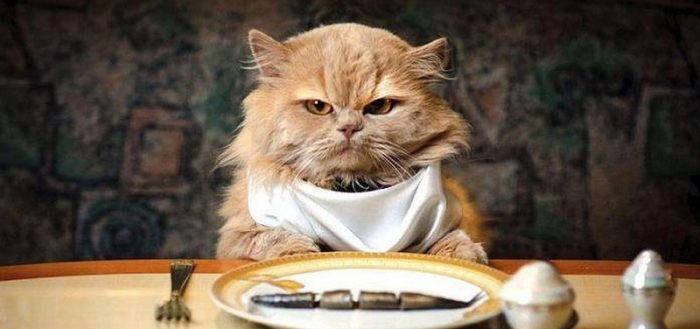
- What to feed a cat with liver disease
- How to tell if a cat has liver disease
- Basic rules of nutrition for liver disease in cats
- The importance of the diet
- Dietary rules that should be followed
- Industrial dry food
- What you can give a sick pet from natural products
- What foods are prohibited?
- What can be given to a sick pet from natural products?
- How to feed the animal after the cure?
- Specialty foods for liver disease
- Pro Plan Veterinary diets HP Hepatic
- Royal Canin Hepatic HF26
- Can a cat with liver disease be fed with natural food?
- Economy
- Premium
- Who is at risk?
- Dry food for cats with liver disease
- Are supplements and vitamins required?
- Conclusions
What to feed a cat with liver disease
Liver disease in cats is dangerous with a high risk of death. If an animal has problems, it is important for people to do everything to protect their pet from developing complications. First of all, it is necessary to adjust the diet, since improper nutrition is the cause of exacerbations.
The role of the liver is that it takes harmful substances from the blood and neutralizes them by removing them through the bile. If the gland is disrupted, there is a general intoxication of the body, as toxins remain unremoved, which affects the function of all internal organs. Complicated liver pathologies are deadly.
- Steatohepatosis – a disease accompanied by obesity of the liver, often caused by improper nutrition of the cat – an excess of fats and carbohydrates in the diet;
- hepatitis – inflammation of the liver, usually of viral origin;
- cirrhosis – a disease in which liver cells die off and in their place appears fibrous tissue, unable to absorb toxins and excrete them with bile, occurs as a complication of other liver pathologies;
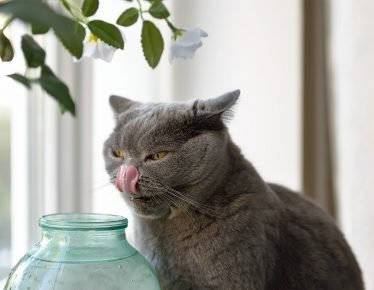
Most often, liver abnormalities are hereditary or arise from improper nutrition, poisoning, or a complicated infection
How to tell if a cat has liver disease
Liver disease can have different causes, but often the clinical picture is similar. A person should be alert to the following signs:
- Frequent vomiting and diarrhea in the cat;
- Color changes in the mucous membranes of the mouth, whites of the eyes, tongue, ears (acquisition of a yellowish hue);
- Strong loss of hair;
- lack of appetite, rapid weight loss;
- weakness in the cat, apathy;
- dark brown or scarlet urine;
- hard and swollen abdomen (at the top);
- signs of pain:
- The animal moves slowly on half-bent paws;
- when you try to touch the abdomen begins to scream, runs away and hides;
Basic rules of nutrition for liver disease in cats
Improper nutrition will aggravate liver disease and lead to the rapid death of the cat. To prevent this, you need to trust your veterinarian to make recommendations for feeding your cat and follow them carefully. These recommendations will vary from case to case, as the ration is made on the basis of the exact diagnosis, the form and stage of the disease, the presence of related diseases, the general well-being of the pet, its age, weight, and breed. Below are only general tips for feeding cats with an unhealthy liver.
First of all, an animal with liver abnormalities needs a lot of protein food. This is necessary to restore the damaged cells of the diseased gland. It is also necessary to make sure that the cat receives daily norm of vitamins and minerals. For example, an adult animal requires daily:
With fats and carbohydrates need to be extremely careful. On the one hand, an animal weakened by illness needs them for recovery. On the other hand, too dense, fatty foods will be a factor in the development of complications, as they will give an excessive load on the diseased liver.
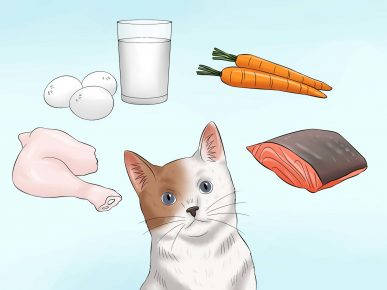
A sick cat's food should be such that the liver is not stressed – it needs food without preservatives and coloring agents, all food should be the freshest
During exacerbations, veterinarians usually recommend a starvation diet for 1-2 days, until the condition improves. Only pure water is allowed. After such a forced starvation, the animal is given low-fat fish and meat broths. With 3-4 days after exacerbation, you can go to a full meal, but in reduced doses – 2 times less than necessary in accordance with the norm by weight and age of the cat.
Reduced doses should be given all the time, because overeating with liver pathology is dangerous – it is better to increase the number of feedings (4-5 times with breaks of 2-3 hours).
The importance of the diet
Cats with liver problems do not get the required amount of hepatocytes. The right diet for cats helps to normalize the amount of this substance. Thanks to this, the body is able to withstand diseases on its own, for example, liver failure. In addition, abnormalities of the filtration organ are often the cause of deterioration of other parts of the body. Often liver disease is the cause of malfunctioning of the urinary system and kidneys. That is why cats are prescribed a diet that helps the body to function normally.
Sometimes diseases of the filtration organ can not be diagnosed in the early stages of development, so they develop into a chronic course. In such a situation, it is not possible to completely cure the disease. In this case, also comes to the aid of the diet, thanks to which it is possible to reduce the impact of substances entering the body.
Dietary rules that should be followed
Owners of cats with liver disease need to remember that sometimes pets may refuse to eat food. This may be due to the development of liver failure or a new healthy diet that the cat does not like very much. The main emphasis in the diet is on proteins of plant origin, which are easier to digest. It is mandatory to give the pet vitamin and mineral complexes, which include potassium and zinc. With the help of such medications will be able to normalize the balance of useful substances in the body, which also contributes to the faster recovery. Before giving vitamins, you should consult a veterinarian, who will determine the proper dose of medication. It is calculated according to the body weight of the pet.
Industrial dry food
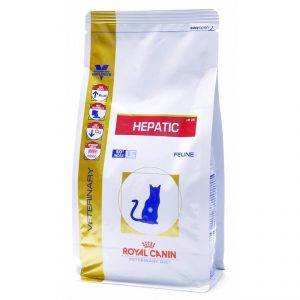
The owner will need to purchase super-premium food for the sick cat. One of the most popular representatives is Royal Canin Hepatic HF26. The product is recommended for cholestasis, hepatic encephalopathy, and insufficiency. Do not introduce this dry food in the diet of cats who have lipidosis of the liver, pregnancy and lactation. As part of the complementary foods are such products:
The duration of feeding this food depends on the liver disease that has been diagnosed. On average, it is recommended to give the cat complementary food about six months. If the pathology of the filtration organ is diagnosed in the chronic stage, feeding dry food is carried out throughout the life of the pet. It is important for the owner to remember that the pet should not overeat.
Feed the pet 3-4 times a day, even in the case when he is petting and asking for more.
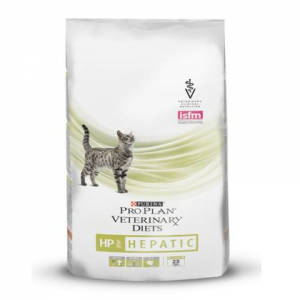
What you can give a sick pet from natural products
The first requirements for "natural food" – all provisions must be fresh. The affected liver simply can't cope with poor-quality food. Do not give too hot or too cold food. Meat, fish and vegetables must be boiled. The diet for kittens with liver disease includes the following foods:
- lean meat and fish broth;
- Decoctions of rice and oatmeal;
- Infusions of herbs, beneficial for the liver, gastrointestinal tract and contributing to the immune system;
- Lean kefir and cottage cheese;
- Shredded boiled chicken breast, beef, sea fish of low-fat varieties;
- Boiled carrots.
What foods are prohibited?
Some foods are not only not useful to the animal, but may cause an aggravation of the disease. Here is a list of what not to feed a cat with liver disease:
After the pet has recovered, the principles of proper feeding must be followed to avoid a relapse. There are specialized balanced dry foods designed for animals with pathology of a particular organ. The names of these premium foods for liver disease include the terms Hepatic or Liver Care.
The following food lines have been adapted for the daily nutrition of kittens with this problem:
Happy Cat Premium Diet, Pro Plan Veterinary diets HP Hepatic, Royal Canin Hepatic HF26, Eukanuba Veterinary Diet Intestinal Formula, Hill's Prescription Diet l/d and several others. They differ from each other in composition. Consult your veterinarian to choose a ready-to-eat food that is ideal for your pet.
If the cat won't eat food from the pet store, you will have to make it yourself. Natural food should basically meet the requirements of the cat's "table" during treatment. Nothing fried, fatty, sweet, smoked, salty. Foods rich in nitrogenous extractive components, cholesterol, oxalates, oxalic acid must be excluded from the diet. Pork, mushrooms, fatty dairy products, eggs, beans, cauliflower, lettuce, greens, etc. are banned.
Most of these products are not useful and healthy pets, but for cats with a diseased liver is just poison. They must receive dietary food for life. Therefore, it is best to find out how to feed the cat in the future from the treating doctor.
What can be given to a sick pet from natural products?
If the owner of a cat with a diseased liver prefers to feed her natural food, he should choose only the freshest products. Any low-quality food can cause serious harm to the animal, because the liver can not cope with its functions. Before feeding, food should be heated slightly, it should not be too hot or cold. Meat, vegetables and fish are pre-cooked.
Read also: Food for cats and kittens "Bozita": composition of dry and wet cat products, pros and cons
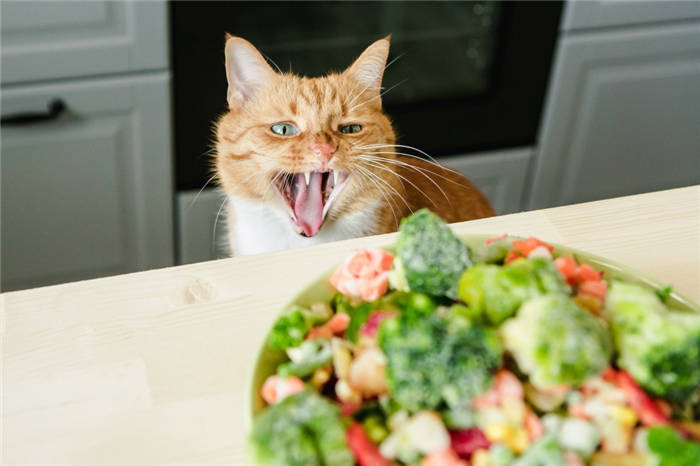
After the first few days of fasting, the cat's condition should improve. When he gets an appetite, broths are included in the diet. Natural dietary food for animals with liver disease consists of the following products:
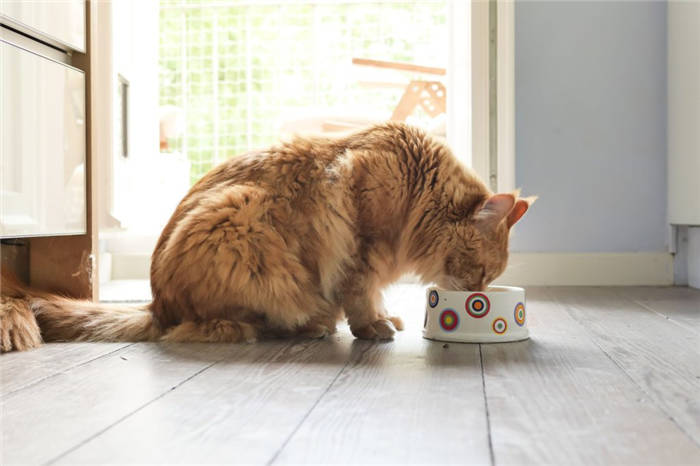
- lean broth from meat or fish;
- rice broth;
- Decoction of oats;
- Infusions of herbs useful for the liver, gastrointestinal tract and immune system;
- at the introduction of solid food in the diet add ground boiled chicken breast, beef, lean varieties of sea fish;
- Kefir and low-fat cottage cheese;
- Boiled carrots.
How to feed the animal after the cure?
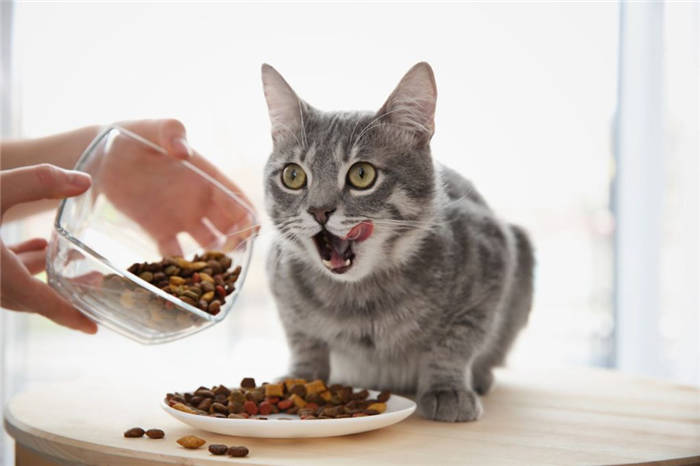
After the end of the course of treatment, the animal also needs to provide the right diet, so as not to provoke a relapse of the disease. There are special lines of food adapted for cats with a tendency to various pathologies. These feeds are competently balanced and suitable for daily diets, they are not therapeutic, but they reduce the risk of recurrence of the disease. The following ranges can be used as preventive nutrition:
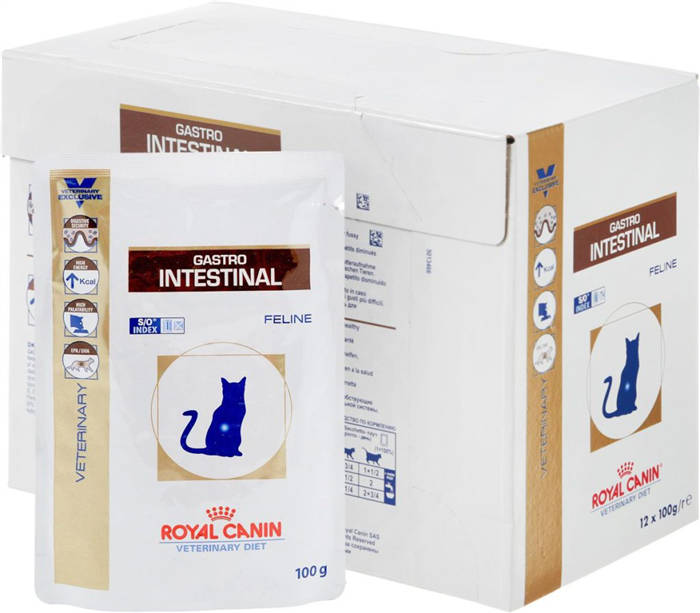
Specialty foods for liver disease
It is not easy to make a diet for a sick pet on your own. You need to take into account his weight, age and the characteristics of the disease to which he was exposed. It's much easier to buy ready-made specialty foods designed for cats with liver problems. In such foods, all the components (proteins, fats and carbohydrates) are fully balanced. In addition, they contain all the necessary vitamins and L-carnitine – a substance that accelerates the regeneration of the liver.
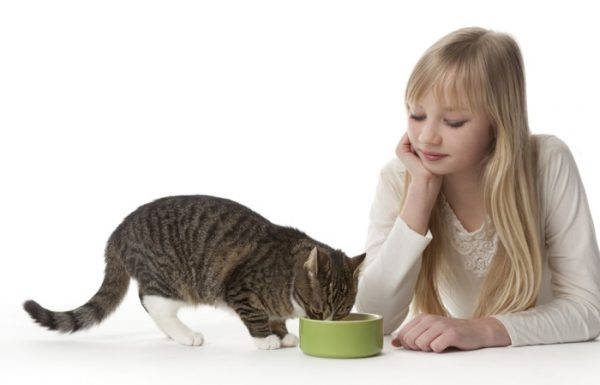
By choosing specialized foods, you not only help your pet to recover, but also save the time it takes to prepare your pet's food
Pro Plan Veterinary diets HP Hepatic
This food contains all the essential substances, vitamins, macro- and micronutrients your cat needs to make a speedy recovery. When you buy Pro Plan Veterinary diets HP Hepatic, you get a product with a limited protein content. This ensures that no toxins accumulate in the cat's body. The food is made with corn, chicken protein, fish oil, egg powder, chicory root and other natural ingredients.
Royal Canin Hepatic HF26
This food is excellent for a cat's diet. It is used for liver failure, cholestasis, hepatic encephalopathy, cholangitis and other diseases. Usually the course of intake of food Royal Canin is 6-12 months. But with chronic diseases, the veterinarian may recommend its use for a longer period. The pellets contain a variety of nutrients: rice, vegetable fiber, corn and wheat gluten, animal fats and pig protein.
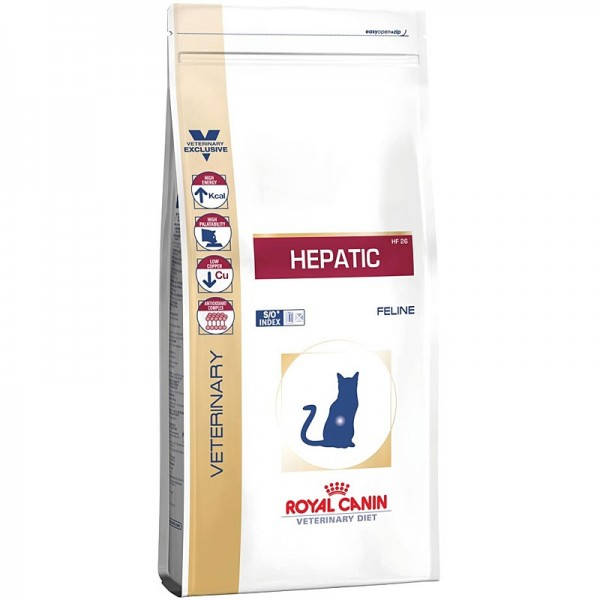
Can a cat with liver disease be fed with natural food?
Not all people want to feed their pets ready-made food, thinking that they are able to prepare better food. But to choose a diet for your pet yourself, you will have to work hard. You need to consider the caloric content of the food, taking into account the fat, protein and carbohydrate content. In addition, you will need to balance the vitamins in the diet. Foods containing large amounts of copper, phosphorus and sodium should be avoided when formulating the diet. These elements burden the liver, preventing it from recovering.
Our Snezhka is 4 years old, foolishly and ignorantly we used to feed her various cheap foods, including store-bought Kitiket and unpacked inexpensive Cat Chow. She was eating normally, but without apparent appetite, her hair was shedding. This summer we went to the vet with otitis, and there we took all sorts of tests. The doctor suggested that our cat should change food and take pills to treat the liver, because we didn't like the liver toxicology. We passed the treatment and since summer we switched to dry food Royal Kanin, we alternate its different kinds. A couple of times a week she also eats Brita canned food. The first variety of RK we tried was VD HEPATIC HF 26 FELINE, to promote the treatment of the liver.
ole4ka-bu
https://irecommend.ru/content/otlichnyi-sbalansirovannyi-korm-khorosh-kak-v-kachestve-dieticheskogo-tak-i-dlya-profilaktik
Eukanuba is a great food, don't hesitate, it will cost you more to feed your pet cheap food. I had a cat that my grandmother starved with cheap food until he had urolithiasis, from which he passed away after a long illness. It was only then that I learned from the vets that foods like Kitikat, Whiskas, Darling, and others are very bad for cats. No, of course I suspected it, but I had no idea it was killing them. Eukanuba mine really like, but I still do not overfeed, just in case, I do not need a second such test (((
Economy
Therapeutic food based on vegetable components and meat by-products. The food contains a minimum of harmful additives, the composition is a little short of the premium class.
The food partially relieves the burden on the liver, so it is often used for chronic diseases or during recovery. It consists of easily assimilable proteins, has a high caloric value and reduces the negative effects of metabolic products on the body.
It contains rice, potatoes, fish, poultry and herbs that have a positive effect on the liver. When switching to this food, the cat receives all the necessary elements, so the owners of the pet will not have to use additional vitamins.
The food is used to prescribe therapeutic diets for liver failure, hepatitis, liver fibrosis, jaundice, encephalopathy, metabolic disorders in the body. The benefits of therapeutic diets during the course of therapy:
- the active component – silybin (isolated from milk thistle seeds) absorbs free radicals, prevents oxidation of lipids, relieves inflammatory processes in the liver;
- Inhibits the production of fibrous tissue;
- Increases the synthesis of proteins – it is necessary to improve liver regeneration.
It contains a high amount of highly digestible carbohydrates, a minimum of fats and proteins. There are vitamins and trace elements – cholecalciferol, manganese, zinc, L-carnitine. There are also vegetable components – dehydrated peas, potatoes, rosemary extract, melon pulp. From animal products – duck and chicken fat, freeze-dried chicken. Antioxidants are used as preservatives.
Premium
As part of natural products of plant and animal origin. Provides a complete daily diet of the cat, do not need to supplement it. Therapeutic foods are taken for a limited period of time. The advantage of premium food is its high nutritional value, the animal eats a smaller portion, and the burden on the body is reduced.
It ranks first in the premium food category as a therapeutic food with reduced fat content, suitable for pets over one year of age. The product is specifically designed to support the health of cats with liver disease. It is indicated for inflammation of the bile ducts, lipidosis, fibrotic hepatopathy, hepatoencephalopathy. A balanced diet reduces the burden on the liver, slowing the progression of chronic disease.
The Dutch manufacturer Hill's has carefully selected the composition optimal for cats with liver disease. The main components are well-digested proteins, proteins, useful trace elements (magnesium, calcium, zinc) and vitamins. The therapeutic food helps to reduce the negative effects of toxic products of metabolism, and due to antioxidants the effect of free radicals is neutralized.
Important: Hill's Prescription Diet cannot be mixed with other canned foods.
- Balanced composition corresponds to the physiological needs of the animal with liver pathologies;
- no harmful additives – flavorings, dyes, preservatives;
- hypoallergenic product is suitable for mono-diet, provides a daily ration;
- cats with liver disease often have reduced appetite and weight loss – high taste stimulates the animal's appetite and accelerates recovery;
- The line provides 2 types of food – dry (in bags) and wet (in cans);
- available in many pet stores.
The food ranks second in the ranking, the diet on its basis has been shown to be effective in drawing up the animal's menu for the treatment of liver disease. The therapy lasts six months, but if the disease is chronic, after consultation with the veterinarian, the time of admission can be increased. In the composition – rice flour, animal fats, minerals, fish oil. The presence in the diet of starch and protein hydrolysate compensates for insufficient digestion, which is often observed in chronic liver failure.
Who is at risk?
Most cases of liver disease in cats are hereditary. Also they can be provoked by infections, improper nutrition. Cats of breeds with a predisposition to metabolic disorders are most often at risk:
In the prevention of liver disease and its effective treatment, cat nutrition plays an important role. A suitable diet should be chosen together with the veterinarian. In each case, the diet will be individual, because the degree of damage, age of the pet, weight, lifestyle are taken into account. However, there are general recommendations.
- The diet of cats should be rich in proteins, which restore damaged liver cells.
- It is important to ensure a daily adequate intake of vitamins and minerals – vitamin B (23 IU per 1 kg of animal weight), D (2.3 IU/kg), phosphorus (160 mg), potassium (180 mg), magnesium (25 mg), zinc (0.15 mg).
- The feed should be strictly balanced in fats and carbohydrates. They should be enough to provide energy for the animal, but not too much, so as not to burden the sick liver.
- Foods with preservatives and dyes of artificial origin are categorically not recommended.
- If the disease is exacerbated, a starvation diet should be introduced for 1-2 days, until the condition improves – but only under the supervision of a doctor.
- The feeding rate should be revised downward, since overeating and gaining excessive weight in liver pathology worsen the situation. The recommended mode of eating is 4-5 times a day every 2-3 hours.
Dry food for cats with liver disease
A pet with a diseased liver is best fed a special dry food, as its composition is calculated taking into account the need for vitamins and minerals, balanced in protein, fats and carbohydrates. You will not have to calculate the proportions, calories yourself. The needs of cats with liver disease are taken into account in these foods:
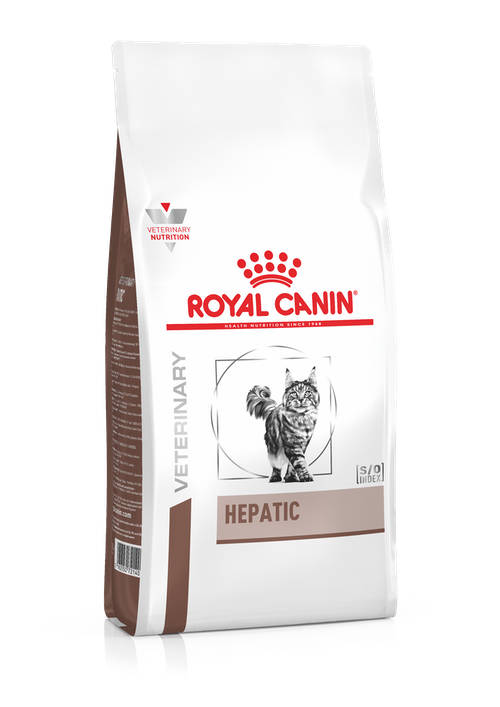
Therapeutic food for cats of all breeds (except during pregnancy) for liver disease. A cat should be switched to this complete diet after consulting with the veterinarian for such diagnoses:
The food is suitable for continuous intake or during exacerbation of the disease – depending on the pathology. As a rule, when liver problems in cats are detected, it is prescribed for six months. Further adjustments to the diet are made with the doctor. For chronic diseases, the food becomes a daily diet for life.
The composition is balanced, but with severe disease, it is recommended to reduce portions and introduce additional meals to minimize the burden on the liver.
- High energy value to provide cats with energy without harming the liver;
- natural flavors, which is especially important for cats with liver diseases, as they often lack appetite;
- low copper, zinc content – to minimize damage to the liver parenchyma;
- high antioxidant content to fight free radicals;
- Highly digestible proteins and L-carnitine accelerate regeneration of hepatocytes.
The optimal vegetable protein content, low pH and limited sodium minimize the risk of complications in the form of liver dysfunction if the cat is fed a constant diet.
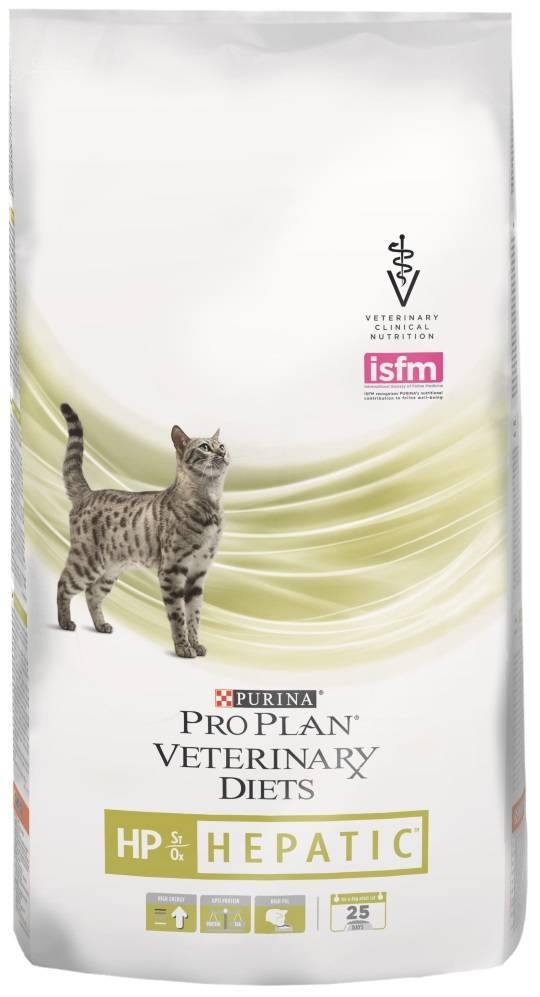
Are supplements and vitamins required?
Prepackaged therapeutic diets take into account the special needs of the body, and a cat that receives this kind of food most often does not need additional vitamin supplements. But with home-cooked food, supplements and vitamins are often needed. The veterinarian decides in each case on an individual basis what supplements and how many should be introduced into the pet's diet.
B vitamins are involved in the metabolic processes which take place in the liver. With liver disease, the cat's body needs them in increased amounts.
Liver diseases, in which the outflow of bile is delayed, lead to disorders in the digestion and absorption of fats, and result in steatorrhea and diarrhea. This contributes to a deficiency of fat-soluble vitamins A, D, E, K.
Enriching the diet with zinc helps to prevent the accumulation of copper in the liver and thus reduce the formation of free radicals in the liver.
Conclusions
Effective treatment of liver disease requires both drug therapy and a proper diet.
Only a veterinarian should prescribe a therapeutic food for the pet. The food is chosen based on the results of biochemical analysis of the patient's blood. While feeding the cat with the therapeutic food, the veterinarian's constant monitoring of the blood count is also required. This will allow you to adjust both the treatment regimen and the diet if necessary.
Entrust the formulation of the diet for the sick pet to a specialist. Proper nutrition will make your pet's recovery more complete and quicker.
- https://cyberleninka.ru/article/n/primenenie-korma-purina-veterinary-diets-en-gastroenteric-v-komplekse-s-terapiey-zabolevaniy-pecheni-u-koshki-porody-britanskaya/viewer
- https://cyberleninka.ru/article/n/aktualnost-ratsionov-primenyaemyh-pri-zabolevaniyah-pecheni-u-koshek/viewer
- https://spbvet.info/zhurnaly/5-2019/ostryy-toksicheskiy-gepatit-taktika-diagnostiki-i-lecheniya/
- Luschai Y. S., Tkachenko L. В. "Fundamentals of animal dietetics: a textbook," St. Petersburg, Lan', 2020.
- Simpson D., Els R. "Diseases of the digestive system of dogs and cats", Moscow, Aquarium Print, 2013.
- Simpson J., Anderson R., Markwell P. "Clinical nutrition of dogs and cats: a guide for the veterinarian," Moscow, Aquarium Print, 2013.
- Chandler E. A., Gaskell C. J., Gaskell R. M. " Diseases of cats", Moscow, Aquarium Print, 2011.
- https://online.pubhtml5.com/skei/idub/#p=158






